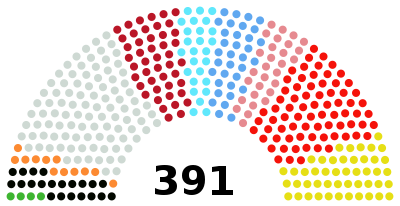Shinjitsu Now

Description
The Shinjitsu Now is the online version of the Shinjitsu, bringing news about the Jingdaoese Empire and the Bassarid Federation directly to the readers.
1657 AN
| Date | Headline | Subject | Summary |
|---|---|---|---|
| 13.06.1657 | Political Slaughter: What will the future bring? | Politics |
DAOCHENG - The 1657 Yuan Elections are over. After weeks of unrest, the final results have been counted and been made public by the Grand Secretariat. With the political landscape divided, the Empire looks to the Meiyo Emperor to lead the way in the upcoming formation of a government. The last elections date from 1550 AN and brought the Badao Party in control of the whole government apparatus. The conservative Kuominliantang was swept away. The following years proved to be challenging, as in 1553 war broke out with our nemesis, the imperialistic Shirerithians. Successes on the battlefield were soon overshadowed by a stalemate which - with some exceptions - lasted several years and costed the lives of many of our citizens. Traitorous movements spread across the ranks of our soldiers, as charismatic soldiers made attempts to influence the way of thinking of the young and influencavble recruits. Some of those movements even succeeded in starting mutinies which had to be crushed by our loyal officers of the Tegong and Kampeitai. We survived the war, we reached our war goals, but the dissatisfaction remained. Especially among those from non-Jing descent a feeling existed that they had served as canon meat. These illusions, fed by leftist propaganda, fell on fertile soil. The Wei family, so-called revolutionaries, even split up in two factions: the traditional and well known Nokarodo under Tsukono Wei which preaches socialism and republicanism, while his son Yamato has established his own, even more radical movement: the Kyosanto Union, which endorses communism and republicanism. Both parties, while despicable and traitorous in nature, have succeeded to enchant the hearts of millions of our less intelligent citizens.  The Badao Party lost its majority and 123 seats, but remained the largest party in the Yuan with 98 seats. Field Marshal Tzao Yao has already publicly apologised for his failure and asked to be 'relieved' from his post. The party congress has responded that the war hero "should not give up half way during the fight". The Nokarodo Faction (74 seats) and Kyosanto Union (47 seats) became the second and third largest parties in the Yuan, bringing a strong leftist and republican opposition into the parliament. The conservatives, the Kuominliantang, was swept away once more and only gained 46 seats. With a loss of another 113 seats, a coalition with Badao would be insuffixient to properly govern the country. The Jiyuto Alliance, a liberal party, won 34 seats. Its members and supporters are mainly merchants and the new middle class who profited from the USSO. Their main goal is the integration of Jingdao in the Bassarid Federation. Another leftist, but moderate, party is the Guoji Party. With 29 seats it also promotes a pro-USSO stance. However, its pro-Kildarian autonomy viewpoint has delivered the party a lot of criticism. The Aikokusha Society (26 seats) is a coalition of small, patriotic groups which assembled under one banner. They are primarily former veterans who seek more recognition for the Empire's war heroes. The Tohokai (21 seats) are far right and, just like the Aikokusha exist primarily thanks to the support of veterans. The party believes that the lack of support from Kildari led to the huge losses in the war. It calls for ethnic segregation, an end to any equality laws and the establishment of Kildarian regions in the less fertile Jingdaoese lands. It seeks to establish a military dictatorship. The Harmonious Centrist Party (12 seats) is a party which seeks to strengthen the role of the religious authorities. It promotes Emperor's Worship, but also wants to expand the authority of the Magister of the Church. From all new elected parties, the Yuanist Revival Association (4 seats) can trace its history back to Yuan Windsor, who acted as ruler of Jingdao between 1593 and 1595. The yuanists believe that the successors of Yuan are destined to lead the country into the future. Sources in the Palace already confirmed that it will most likely ask the Bureaucrat Zhang San to remain in office, for as long no agreement can be reached between the parties. |